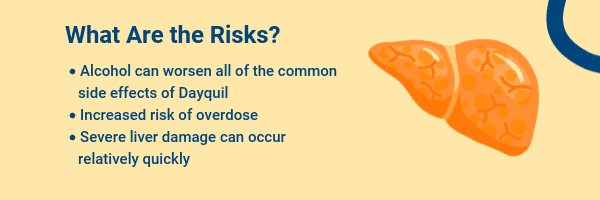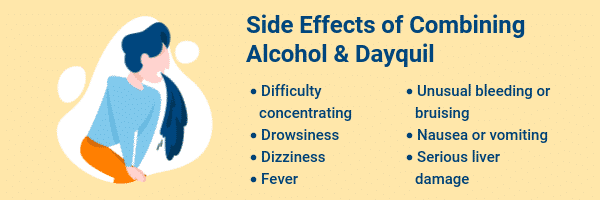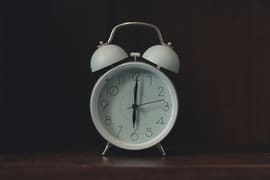Alcohol can interact with certain medications, but how does it interact with Dayquil?
Dayquil Cold & Flu (commonly referred to just as Dayquil) treats symptoms of the cold and flu. Dayquil Cold & Flu is an over-the-counter medication that contains acetaminophen, dextromethorphan, and phenylephrine. Acetaminophen is a pain reliever and reduces fever, phenylephrine is a decongestant, and dextromethorphan is a cough suppressant. However, different Dayquil formulations contain different active ingredients, so always remember to read the product label.

In general, do not drink alcohol during a cold or flu. Alcohol dehydrates the body and weakens the immune system. However, some people with a cold or flu may still be interested in drinking alcohol while taking Dayquil. There are several important facts to consider before combining the two drugs.
The Risks of Mixing Alcohol & DayQuil
Alcohol should not be mixed with Dayquil because:
- Alcohol interacts with both acetaminophen and dextromethorphan
- Different doses of Dayquil interact negatively with alcohol
- In high quantities, alcohol, and acetaminophen directly damage the liver
- Using both substances together can increase a person’s risk of overdose
Liver Damage Risks
The Food and Drug Administration’s recommended daily maximum dose of acetaminophen is 3,000 mg. However, the maximum daily dose is lower if a person drinks alcohol regularly. Dayquil LiquiCaps contains 325 mg of acetaminophen, while the syrup contains 650 mg per dose. The manufacturer notes that severe liver damage may occur if someone:
- Takes more than four doses of Dayquil within 24 hours
- Combines Dayquil with other medications that contain acetaminophen
- Consumes three or more alcoholic drinks daily while taking Dayquil
Acetaminophen- or Dextromethorphan-Associated Risks
Acetaminophen overdose is, unfortunately, a common occurrence, so always stay within the recommended dose of Dayquil. Be aware that many other over-the-counter and prescription drugs contain acetaminophen. People should speak to a doctor or pharmacist if they drink alcohol and wish to take Dayquil.
Like acetaminophen, dextromethorphan used in combination with alcohol is dangerous and can result in an overdose. Some people might use high doses of dextromethorphan recreationally to produce a euphoric feeling. However, harmful side effects have been reported, including delusions, paranoia, and hallucinations. Alcohol can make these effects worse.
The Side Effects of Combining Alcohol & Dayquil
At standard doses, side effects of Dayquil may include dizziness, headache, upset stomach, anxiety, difficulty sleeping, and liver damage (because of the acetaminophen). Alcohol can worsen all of the common side effects of Dayquil and increase a person’s risk of overdose.

- Difficulty concentrating
- Drowsiness
- Dizziness
- Fever
- Unusual bleeding or bruising
- Nausea or vomiting
- Serious liver damage (because of acetaminophen used with alcohol)
- Increased risk of alcohol use disorder
- Hallucinations
- Confusion
- Excessive drowsiness
- DelusionsParanoia
- Dizziness
- Nausea
- Vomiting
- Abdominal pain
The psychotic effects are primarily the result of dextromethorphan, while vomiting and abdominal pain may be a sign of acute acetaminophen overdose. However, it is important to note that acetaminophen can damage the liver without any immediate side effects.
An overdose with Dayquil and alcohol is dangerous and potentially fatal. Contact a medical professional immediately if you suspect an overdose related to Dayquil and alcohol use.
Need help for alcohol addiction? The Recovery Village offers high-quality alcohol detox and alcohol rehab treatment at our accredited treatment facilities across the country. Contact The Recovery Village today to speak with a caring representative about programs that could work for you.
Articles Related to Alcoholism

Alcohol detox isn’t easy and not everyone can do it on their own. That is why alcohol detox and alcohol withdrawal treatment is administered by medical professionals.

Alcoholism takes many forms, and the stereotype doesn’t always hold true. So when do a few drinks with friends become a full-blown alcohol addiction? How do you know if you are an alcoholic?

While cirrhosis scars from excessive drinking are irreversible, quitting alcohol and leading a healthier lifestyle can help your liver heal from alcohol-related liver disease.

When detoxing, hydration is key. However, certain food groups also have benefits when it comes to helping with the discomfort of withdrawal symptoms and detoxification.

Detox from alcohol can begin within hours. Typically, alcohol withdrawal symptoms happen for heavier drinkers. Alcohol withdrawal can begin within hours of ending a drinking session.

Daily drinking can have serious consequences for a person’s health, both in the short- and long-term. Many of the effects of drinking every day can be reversed through early intervention.


U.S. Food and Drug Administration. “Acetaminophen Information.” Published on November 24, 2017. Accessed March 24, 2019.
DailyMed. “DayQuil Package Insert.” Published March 23, 2017. Accessed March 24, 2019.
Martinak, Bridgette, et al. “extromethorphan in Cough Syrup: The Poor Man’s Psychosis.” U.S. National Library of Medicine, 2017. Accessed March 24, 2019.
Medline Plus. “Dextromethorphan.” U.S. National Library of Medicine, 2018. Accessed March 24, 2019.
Medline Plus. “Phenylephrine.” U.S. National Library of Medicine, 2018. Accessed March 24, 2019.
Center for Substance Abuse Research. “Dextromethorphan.” Published on October 23, 2013. Accessed March 24, 2019.
Merck Manual. “Acetaminophen Poisoning.” Published January 2018. Accessed March 24, 2019.
The Recovery Village aims to improve the quality of life for people struggling with substance use or mental health disorder with fact-based content about the nature of behavioral health conditions, treatment options and their related outcomes. We publish material that is researched, cited, edited and reviewed by licensed medical professionals. The information we provide is not intended to be a substitute for professional medical advice, diagnosis or treatment. It should not be used in place of the advice of your physician or other qualified healthcare providers.